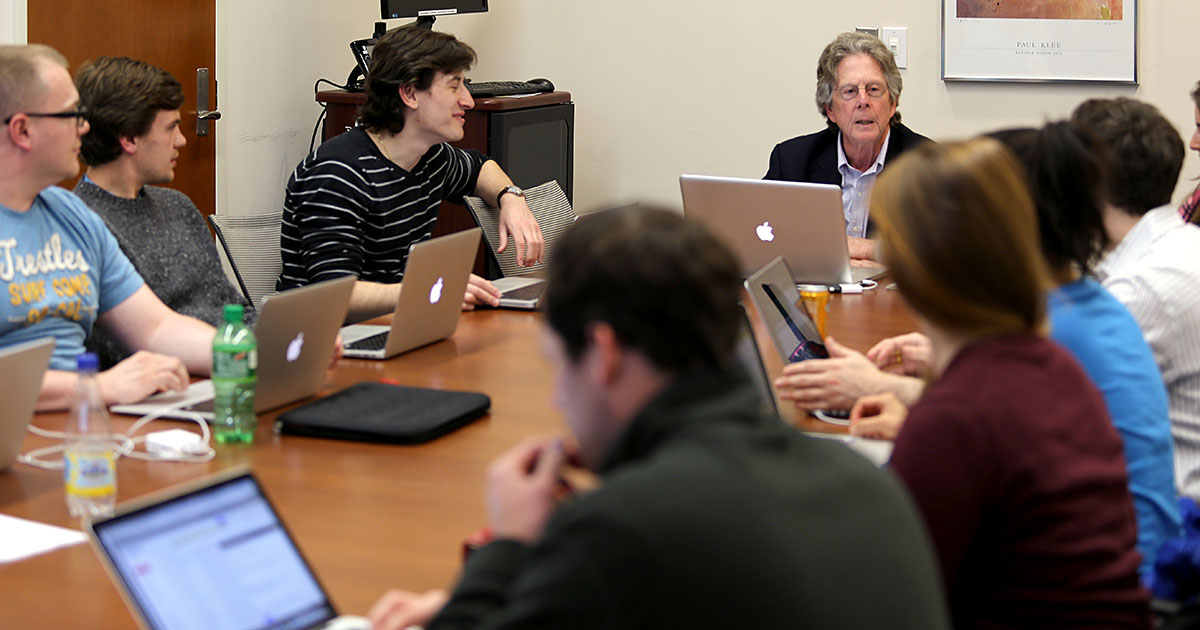University of Virginia School of Law students negotiated a mock business deal with Northwestern University students this semester as part of a course offering a new, hands-on approach to learning.
In the scenario, the 15 students who took U.Va.’s “International Business Negotiation” course represented a U.S. pharmaceutical company negotiating a deal with an African agricultural production company, represented by 20 Northwestern law students, in order to obtain a key drug ingredient. The fictional stakes were high: a joint venture, a licensing agreement, a long-term supply contract – or no deal at all.
“The highs of successfully negotiating an issue that both sides had been fighting over for weeks balanced out the lows of seeing a negotiating strategy fall apart over seemingly insignificant issues,” said Jeff Wittman, a first-year law student who led some of the negotiations. “Working closely with the class to achieve a common goal all semester made the whole experience feel like the outcome was real.”
Though the students didn’t officially ink a deal during the class, the two parties reached an agreement on terms, said first-time instructor Ned Martin, who has four decades of experience in domestic and international business negotiations and was most recently a partner at the global law firm DLA Piper.
“The deal was to the stage where it was appropriate to sign a letter of intent,” Martin said.
“International Business Negotiation” adds to the growing list of courses in the John W. Glynn Jr. Law & Business Program, including the Transactional Law Clinic, that emphasize practical experience.
On the last day of class, Martin projected a slide with negotiating tactics such as “good cop/bad cop,” “bluffing” and “one more thing” written on it, while his students engaged in spirited conversation about the final bargaining session. The live negotiations took the form of sometimes friendly, sometimes tense, videoconference calls held on five Saturdays during the semester.
“Could we have been more direct?” one student asked during the class. “We could have just said, ‘This is what the deal’s about and this is where you stand to gain.’”
Martin gave the students room to draw their own conclusions before adding his assessment. He agreed that although sometimes saying less, or nothing at all, during a negotiation can be an effective tactic, at other times a forthright approach can be useful over a coy one. He added that a good deal can go bad if a party doesn’t have enough time to consider an offer.
“People do not handle well an issue or analysis presented to them for instant response,” Martin said. “If you have to answer as you take the information in, the answer will always be ‘no.’”
During the course, all students took turns acting as lead adviser in drafting communications and chairing discussions. They also kept diaries of their impressions of the process, strategy and the progress of the negotiations.
Third-year law student Christine Gilleland, who hopes to specialize in the financial and mergers-and-acquisitions aspects of international deals, said she learned the power of patience when working with large groups of people, and the value of being the more prepared party when going into a negotiation.
“You never want to find that the counterparty is more prepared than you are, because that can result in losing the counterparty’s goodwill and respect, in you conceding something you do not intend to concede, and in not advocating for something that you should advocate for,” she said.
Wittman, the first-year student, said he learned the importance of closely analyzing a company’s business and transaction objectives in preparation for a negotiation, to better appreciate opposing party relationships and to revise his assumptions based on the fluidity of the situation.
Before the class, Wittman had no previous experience working with transactional law and had been considering a career as a litigator. Now, his focus has changed.
“The class has given me the foundation to be comfortable discussing complex transactional agreements and the confidence to negotiate over difficult corporate concepts,” he said. “I will rely heavily on my experiences from the class, as I now intend to pursue a career in transactional law.”
The students said Martin was an engaging professor who shared anecdotes from his own experience and remained actively involved in their learning, even outside of class.
“When a team was working on documents or preparing to lead a negotiation, Professor Martin would be in touch with the team up to 10 or 20 times a day by email, and in touch with the class five or more times a day,” Gilleland said. “He was actively working on responding to our comments and questions, and raising questions to consider himself, for the majority of every week of the semester. This made it so that each team could enter the negotiating room or send a communication to the counterparty with great confidence, knowing that we were as prepared as possible to represent our client.”
The course is based on a scenario developed by two faculty members at American University, who match schools interested in participating in the scenario. Martin said the class is organic, with the negotiations never playing out the same way twice, which is part of its appeal.
“What I told the students is, it’s uniquely a course they create,” said Martin, who is slated to teach the course again next year. “I’m the football coach, but they are playing the game.”
Media Contact
Article Information
May 1, 2014
/content/deal-or-no-deal-law-course-simulates-high-stakes-international-business-negotiation

